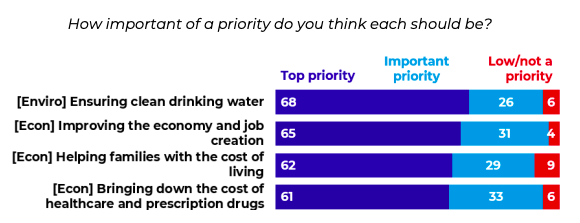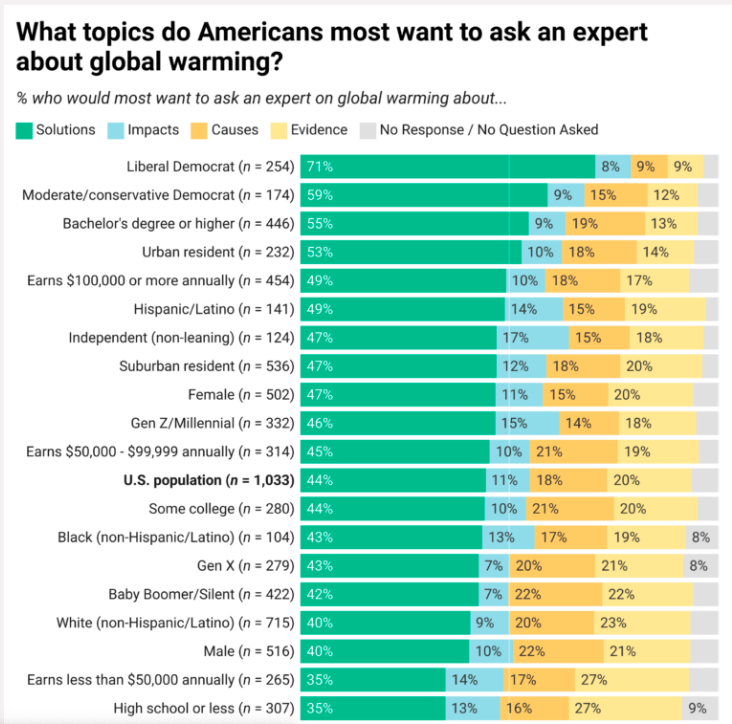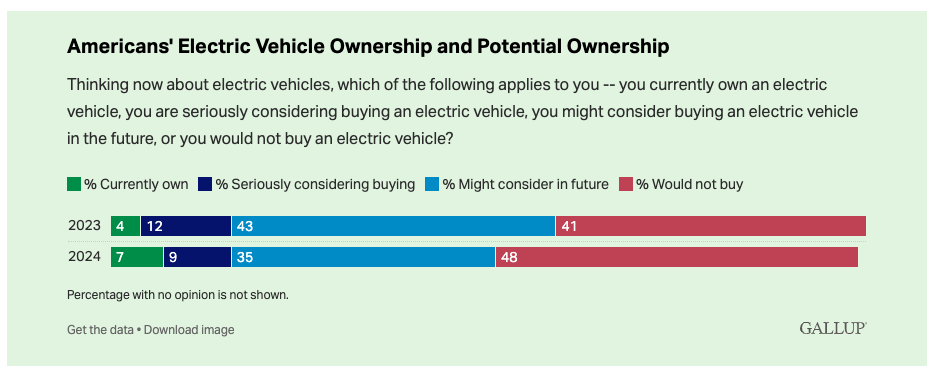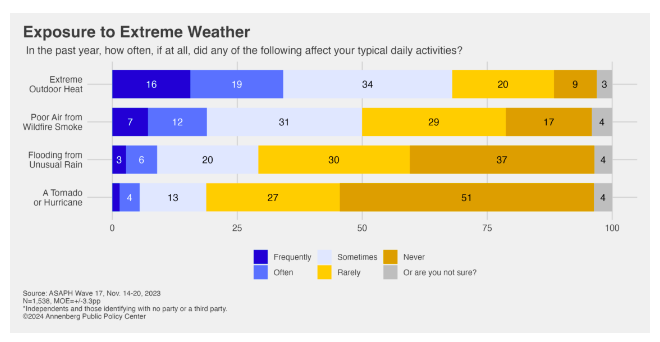Resources
Search below for resources covering the intersection of climate engagement, social science and data analytics.
RESULTS
Voters recognize plastic pollution as a major problem and an overwhelming, bipartisan majority support the U.S. joining a Global Plastics Treaty. Most voters rate plastic pollution as a “crisis” or “major problem” both globally (79%) and in the United States (70%). When it comes to measures to “reduce the production of plastics” specifically, 87% say that they support this type of action – including large majorities of Democrats (94%), independents (80%), and Republicans (80%). Voters across party lines support the U.S. joining a Global Plastics Treaty.
Environmental Polling Roundup - April 19th, 2024
This post includes climate and environment headlines, data points, and key takeaways from recent public polls - including new polling on Americans’ climate attitudes, climate-related provisions in President Biden’s budget plan, and plastic pollution.
HEADLINES
A steady seven in ten Americans recognize that climate change is happening, including a particularly high percentage of AAPI adults. Americans rate Biden far better than Trump on climate change, but only three in ten say that Biden has made a positive impact on the issue. 67% of Americans say that oil and gas companies are doing too little to address climate change. 58% of Americans say that oil and gas companies have “a lot” of responsibility to address climate change. The majority of Americans (56%) say that the federal government is doing too little to address climate change.
Voters strongly support provisions in President Biden’s budget to close Big Oil tax loopholes and lower energy costs. Roughly three-quarters (77%) support Biden’s proposal to “close tax loopholes that benefit Big Pharma, Big Oil, and wealthy corporations,” including a majority (56%) who strongly support this proposal.
What do Americans want to know about climate change?
Americans are more interested in hearing about solutions to climate change than causes, impacts, or evidence. Yale and GMU find in a new analysis that far more Americans would ask about solutions (44%) than evidence (20%), causes (18%), or impacts (11%). Left-leaning audiences are particularly eager to hear about solutions, but conservative audiences still want to hear about the evidence and causes. Of major political and demographic subgroups, Yale and GMU find that liberal Democrats (71%) are the most likely to say that they would ask solutions-focused questions.
Environmental Polling Roundup - April 12th, 2024
This post includes climate and environment headlines, data points, and key takeaways from recent public polls - including new polling on electric vehicles, young Americans’ attitudes about climate change and President Biden’s climate actions, and the SEC’s new climate risk disclosure rule.
HEADLINES
New Polling Shows Voters Strongly Support SEC Climate Risk Disclosure Rule
Voters support the SEC’s new climate risk disclosure rule and widely agree that people should be able to take climate-related risks into account in their investment decisions. Voters say that large companies and corporations should be held accountable for their environmental impacts: four in five (80%) say that large companies and corporations have a responsibility to manage their impact on the environment, including nearly half (46%) who say that companies have “a lot” of responsibility for managing environmental impacts.
EV Ownership Ticks Up, but Fewer Nonowners Want to Buy One
Roughly half of Americans say that they would consider an EV. The percentage of Americans who own EVs has increased in the past year, but so has the share who say that they “would not buy” one. 7% of Americans now report owning an electric vehicle, up three points from last March (4%). The percentage who are “seriously considering” buying an EV has dipped by an equivalent amount, from 12% down to 9%. Taken together, these two shifts suggest that there is a steady share of the population – roughly one-sixth of adults – who either own or are seriously in the market for an EV.
Environmental Polling Roundup - April 5th, 2024
This post includes climate and environment headlines, data points, and key takeaways from recent public polls - including new polling on extreme weather, climate change, and plastic pollution.
HEADLINES
Experiencing Extreme Weather Predicts Support for Policies to Mitigate Effects of Climate Change
Americans who report experiences with extreme weather are more likely to support pro-climate policies. 62% of Americans support tax credits for families who install rooftop solar or battery storage in their homes. 62% of Americans support increasing investment in energy-efficient forms of public transportation. 60% of Americans support grants to communities to protect them from the impacts of climate change, including drought, heat, and extreme weather. 57% of Americans support forgivable loans for rural communities to improve their energy efficiency.
Pagination
- Page 1
- Next page






